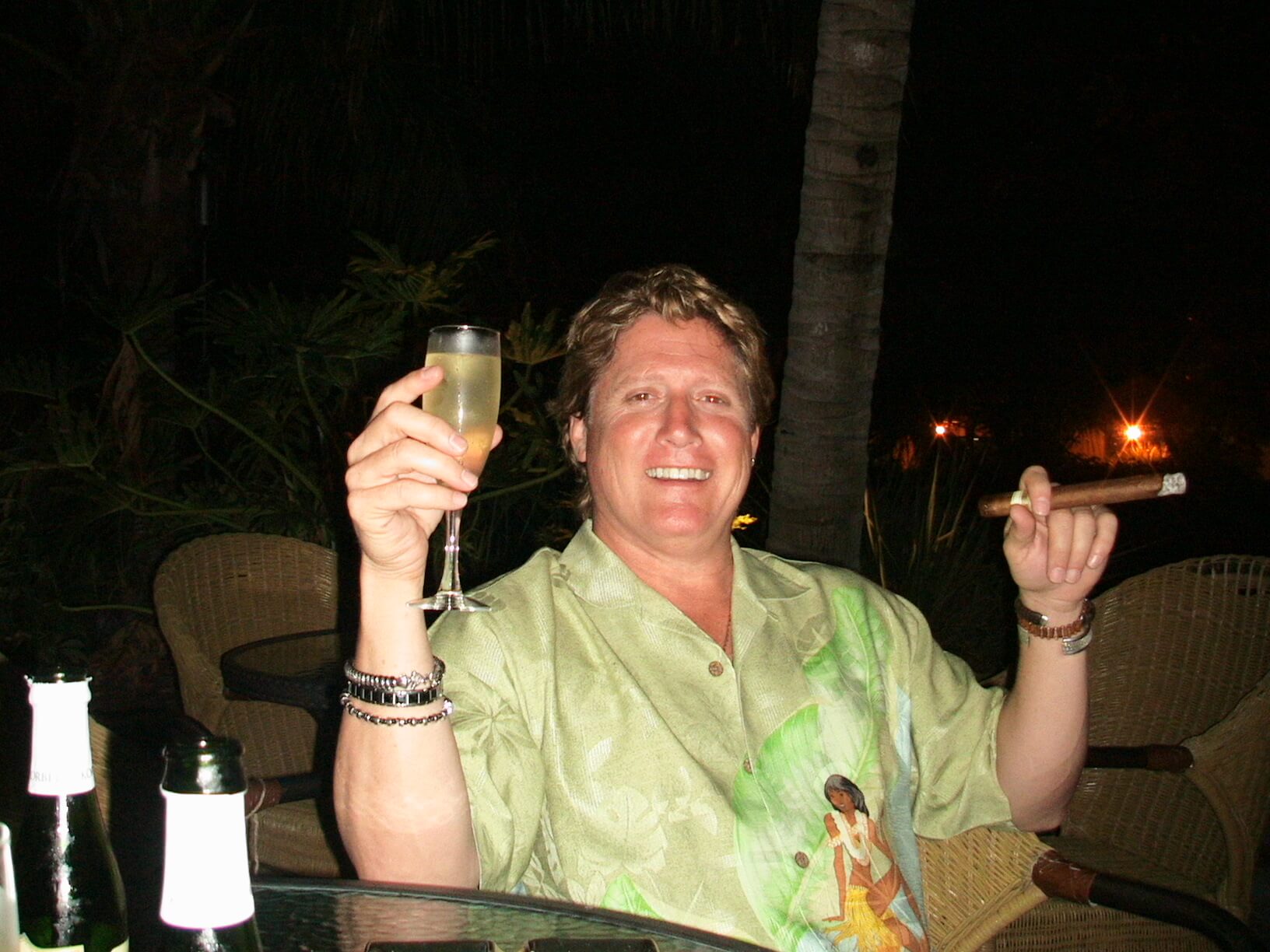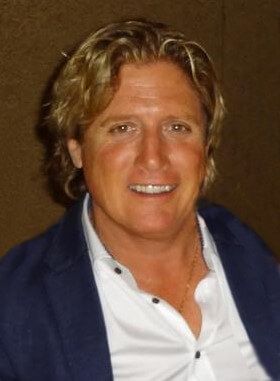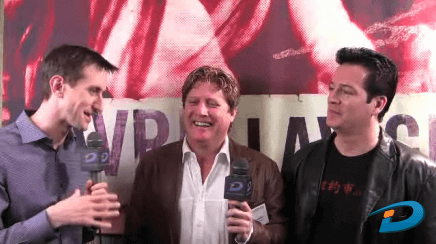I originally met Michael over a decade ago, at that point in time I just knew him as this legendary figure who owned some of the world’s best domain names, and had a real talent for turning them into revenue-generating businesses. The photo above is from an interview I did with Michael and his brother David 11 years ago.
I’m fairly certain that the first time I met Michael, I was so nervous that I stumbled on my words and probably sounded like complete dork. Luckily Michael is one heck of a nice guy and he was nice enough to spend some time chatting with me.

Since then we’ve had the chance to have some good adventures together in Vegas to cigars in Laguna Beach. As I’ve had the chance to get to know Michael and his brother David more I can tell you, they are true visionaries. Along with having one of the best domain name portfolios on the planet, they also have the business acumen to turn these domains into real businesses, and that they have done, over and over again.
So when Michael casually mentioned that he was building out Traveler.com I jumped on the opportunity to be the first to interview him about it. But I felt like I’d be missing the mark if I didn’t ask Michael to do a deeper dive into his background in the domain industry and some other fun stuff.
What is about to follow, I have to say is one of the single best pieces of content I’ve ever published on this blog. Michael shares so many nuggets here, I’ve already read it three times, and I’m predicting a fourth read in my future. Huge thanks to Michael for taking the time to answer these questions in the depth that he does, I am humbled and honored, and to you, my reader, I give you the one and only Michael Castello, enjoy!
[MORGAN] Before we dive in, for people who might not know you, can you share a bit more about how you first got into domain names?
[MICHAEL] I was using and navigating intranets like Prodigy back in the 80s. There was no need for a domain name for my musical career back then since the internet was mostly used by universities. In 1993 President Bill Clinton opened up the internet to commercialism which propelled .com. I noticed that Prodigy was offering access from its intranet to the internet. I could use an internal browser, ftp, telnet and email from Prodigy’s toolset. I realize now that I was hacking at the time but didn’t really know it.
I remember speaking to a friend that was on a musical tour who needed some files that I had. I went online and found a website called Journey.com and logged my FTP tool into it and created a folder on their server. I then uploaded the files to that folder for my friend to retrieve the files he needed. Everything back then on the net was wide open. I used anonymous as my username and presto I was into their server. There was nothing nefarious about it. I just had a way to get him the files needed online.
Around that time, I was engaged in random access recording. That’s what everyone is doing now, but back then “no one” was doing it. Having a song file back then didn’t have a public way or a purpose yet. The technology wasn’t available on a mass scale like it is today. I had the idea of putting those musical files on a website or server for friends to retrieve them. I needed a website to place them on that I controlled. That started the process of understanding that I needed a domain name for someone to remember for them to be able to visit my server and music. When I saw an obstacle, I found a solution. That is how I got into the domain name game in 1994.
—
[MORGAN] You have a history of buying great domains and turning them into businesses, what inspired you to do this?
[MICHAEL] In the early internet, there was no spam. I would put up a website with an email address and people from all over the world would contact me with what they expected to find on that address/domain name. That got me thinking-what if I put up what they are looking for? I remember putting online many generic one-page websites like Pear.com, Tangerine.com, Grape.com and Banana.com. For reasons that became obvious later, Banana.com got the most traffic. Visitors going to that name were looking for porn. I wasn’t going to create a porn site so I figured Chiquita Banana was best suited for the name. That started me on the potential of selling names.
I realized that most of the names I registered dealt with the things l liked doing most. Golf was GolfClub.com, Racer.com for fast cars and Travel was Traveler.com. I could create businesses that I enjoyed, make money from them and write off those expenses as a business. I enjoyed traveling to Palm Springs and golfing there. I had three businesses that I could produce content for in one trip.
—
[MORGAN] Do you remember the first domain you developed? Can you share a bit more about it?
[MICHAEL] It was PalmSprings.com. Back in 1994, it was taking a lot of time for me to send in a registration for a domain name and then wait six weeks for a reply to see if I successfully registered it. Early one morning, I checked my email and I saw that I registered PalmSprings.com. I was very happy about that one. No more than 30 minutes later a guy calls me on the phone as asked me how I got the name. I thought that was odd. I told him that I had been waiting for six weeks on the name and he told me that he had an inside connection at NetSol and would have been able to reserve it in thirty minutes. I guess I thought of registering it six weeks earlier than he did. I did not know what the big deal was until he said to me “you’ve got a goldmine in that name”.
That turned out to be correct. Just three years later the front page of PalmSprings.com was making almost a million dollars a year.
—
[MORGAN] What domain development project are you the most proud of?
[MICHAEL] I am proud of many of my websites. They are like children. You put a lot of time and care into them. PalmSprings.com got the most of my time and effort. I cut my developmental teeth on that name. I came to understand how important it was to give your visitors what they expected.
Once you have the traffic, you get the money.
—
[MORGAN] Now let’s talk about a brand new development project that we might be actually sharing with the world for the first time in this interview, Traveler.com – how did this domain come up as your next development target?

[MICHAEL] How many pages do you have for this article? In short, I was fortunate to register Traveler.com. It was originally registered in 1991. I picked it up in 1997. There are very few generic names you can use for travel. Traveler is a word that for me is more personal than travel. We are all travelers. Whether by land sea, space or time
Traveler.com has had many starts and turns. In the 90s, Hotels.com was paying me $25,000 a year to point it to them. Room.com was getting the same deal. At some point in 2006, we partnered up to develop it. We had some great ideas that envisioned heads-up glasses to use when traveling. When you signed up, we had a responsive pictured questionnaire that gave us an idea of your travel preferences. We called it TravelerDNA. When you traveled, the location of your preferences, like a wine bar, cigar shop, or art museum, would show up in your heads-up glasses. You could then visually walk to your destination by following the floating destination in your glasses. TravelerDNA would also be the avenue for advertisers to promote and reach their clientele. There was a potential revenue stream to drill into.
Everything was moving great until we hit the great recession of 2008. Travel came to a halt and so did the project. That Traveler venture was exciting. Now, just like in 2008, the pandemic has kept people at home and not traveling. As the pandemic subsides, and people are able to move about as normal, Traveler.com is finding a greater purpose again.
Back at the TRAFFIC Conference at the Grand Hyatt in NYC in 2007, the president of Kayak spoke and took questions. I asked him what he thought of the name Traveler.com. He asked if I owned the name and said that it was a great domain name. He suggested that it would be the perfect platform for a travelogue.
That is where we are now taking Traveler.com. We are going to make it a platform for travelers to post their adventures. My daughter Jessica is the editor, and we will be starting out giving invites to those that can give us feedback on where we need to go, and the tools that are required to make it a viable resource for those that will be traveling to world destinations.
It’s a tall task but Traveler.com is poised to do great things. I am offering an invite, to you Morgan, as our first member. I hope you post your travelogue from your upcoming Yosemite trip.
(note from Morgan – you can bet I will!)
—
[MORGAN] What are some of the first steps you take when developing a domain like Traveler.com?
[MICHAEL] I learned early on, that you must project way forward for what will be needed in the future without going broke trying to achieve it. Great ideas too early can ruin a business if not budgeted and structured properly.
My son works at JPL NASA. JPL puts rovers on Mars but the effort that is taken to make sure things go right starts years earlier.
I ask questions like; How big and how many users can the software program and server handle? If there is a threshold that cannot be met, can database structure be migrated to a higher level. If the initial budget can manage its growth, would there be an avenue to increase the budget quickly if an avalanche of users come online? Those are the things that keep me up at night. It could make the difference of losing an opportune time of growth or taking advantage and growing with the need.
—
[MORGAN] Why did you decide now is the time to develop this name?
[MICHAEL] After the lockdowns, people are yearning to travel. Projects usually start off small and efficiently. I have the time; my daughter loves to travel and write so I have the know-how and basic elements in place to start the project.
[MORGAN] What are your plans for building this out and vision for what it could become?
[MICHAEL] I built Traveler.com on a fast dedicated server. We are in the beta stage that is functional. We are still testing to see what tools are needed for an author or contributing member to easily post their travelogue. While there are other platforms that allow for the aggregation of all content, we want Traveler.com to be about travel, stories, and memories. We will also have a section called Time Traveler. That is a section where you can post past trips or memories. I know many that have great stories to tell and pictures to post.
I am writing one called Riding with the Devil. It goes back to the Sunset Strip in 1991 and paints a picture of my knowing David Koresh. He was a guitar player and wanted me to sing for his band. I even went to the compound in WACO. It was a part of history and I think Time Traveler would be a great venue to reveal it.
—
[MORGAN] What advice would you give other domain investors who want to develop domain names?
[MICHAEL] DO IT! It is so user-friendly and easy these days. Register a domain name. Create a website on Wix.com, where you can create a WordPress themed site for free, point your domain name to that Wix address and you are on your way. Learn it.
—
[MORGAN] I always end my interviews by asking for one fun fact about yourself that other people might not know, anything you can share that might shock us or make us laugh?

[MICHAEL] Back about 10 years ago I invited several of the top domainers to the Peninsula Hotel in Beverly Hills for three days. Frank Schilling, Scott Day, Garry Chernoff, Jay Chapman and my brother David and I attended. Kevin Ham confirmed but was not able to make it. Frank suggested we have a friendly verbal NDA or FriendDA. We took those three days to open up our business practices to each other on what worked in each of our respective fields. It was a good time, and we learned a lot from each other. We all agreed on conferencing together every six months but that was our one and only meeting. I wish we had continued it as I think we are stronger working together than separately especially in an industry that needs visible leadership.




